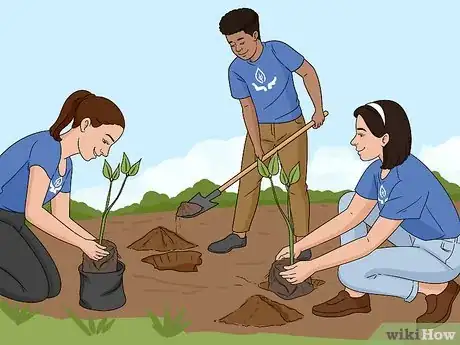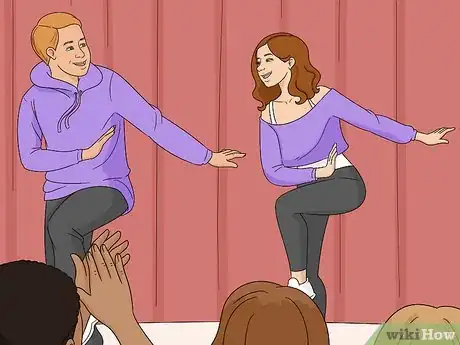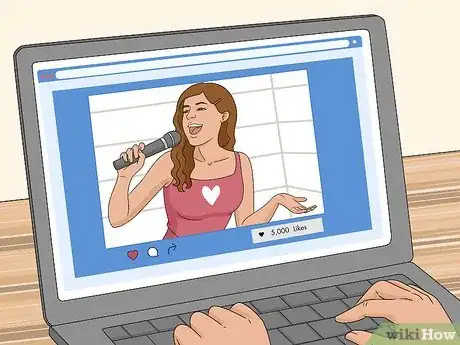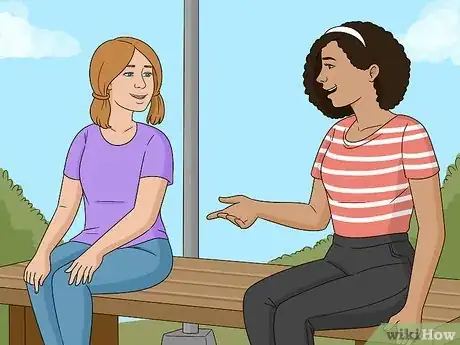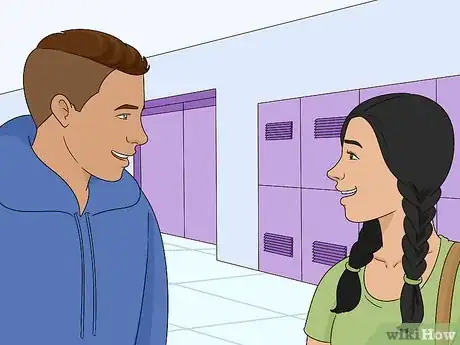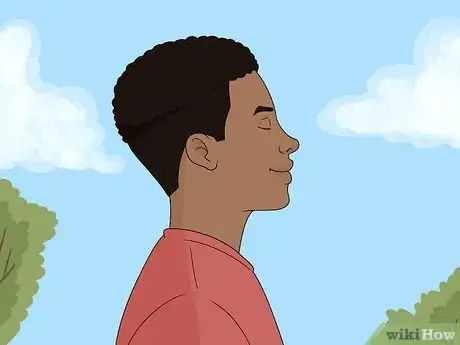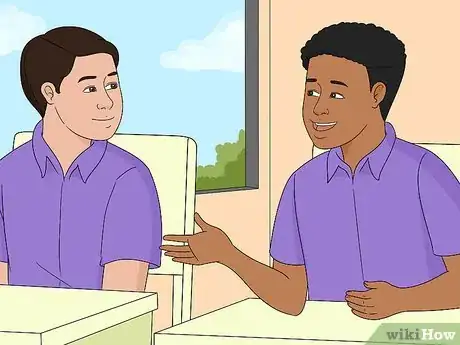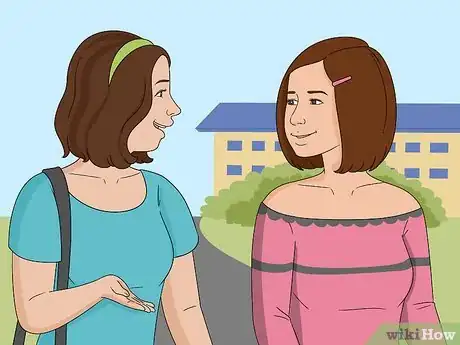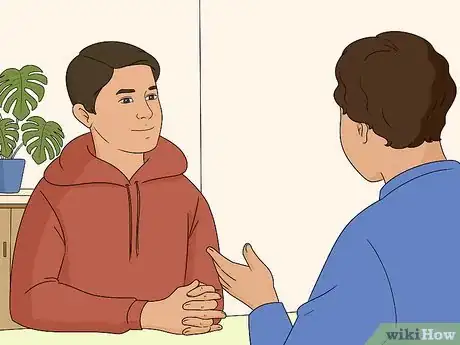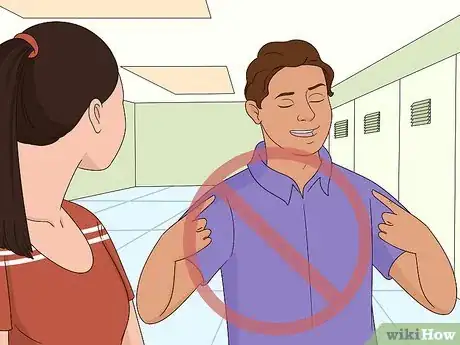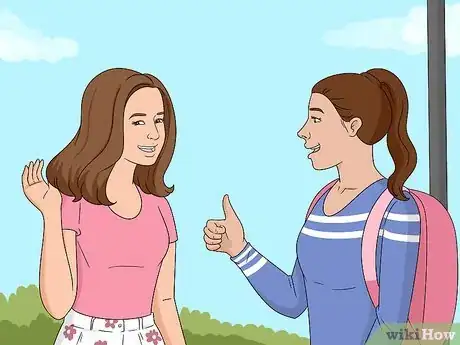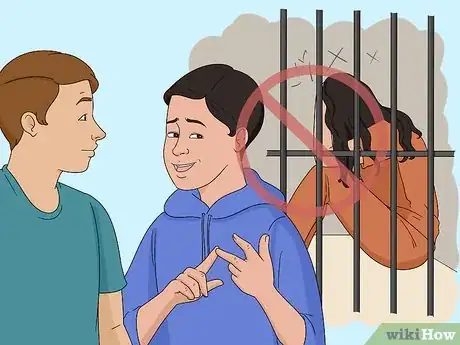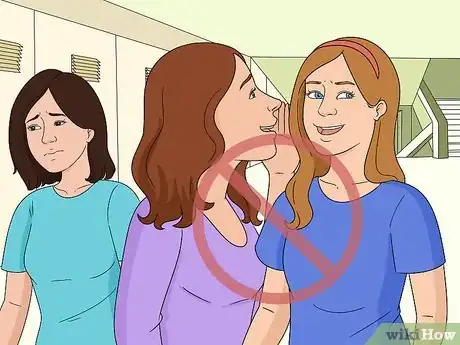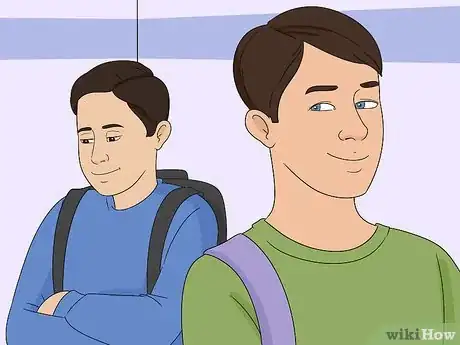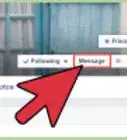This article was co-authored by Ashley Pritchard, MA and by wikiHow staff writer, Amy Bobinger. Ashley Pritchard is an Academic and School Counselor at Delaware Valley Regional High School in Frenchtown, New Jersey. Ashley has over 3 years of high school, college, and career counseling experience. She has an MA in School Counseling with a specialization in Mental Health from Caldwell University and is certified as an Independent Education Consultant through the University of California, Irvine.
There are 15 references cited in this article, which can be found at the bottom of the page.
This article has been viewed 374,148 times.
When you get to high school, it can seem like it's hard to make new friends because everyone already knows each other. For others, it's the intimidating step of making completely new friends if you've graduated a K-8 private school. However, it's never too late to expand your circle of friends or make new ones. Start by taking steps to meet new people that you might have something in common with. When you come across someone you like, strike up a friendly conversation and see where it goes!
Steps
Join a club or team.
-
Get involved in something that interests you. If you want to make new friends, you’ll need to start by finding new people to be friends with. One great way to do that is by joining an academic club, sports team, or other school-related organization. If it's something you're interested in, you'll automatically have something in common with the other students who've also joined.
- Clubs are a great option because they provide a structured environment for you to interact in and can expose you to people with whom you already have something in common.[1]
X
Expert Source

School Counselor Expert Interview. 4 November 2019. Depending on your interests, you might join a service-oriented club, a language club, a gaming club, or a literary magazine, for instance. - Join an academic or athletic team.[2]
X
Expert Source

School Counselor Expert Interview. 4 November 2019. Being on a team provides built-in camaraderie and plenty of chances to hang out with the other people on the team.[3] X Research source If you're athletic, you can join a team sport like soccer, lacrosse, or cross-country. If you're more academic, you might join Model UN, Scholars' Club, or debate team. - You can also sign up for electives like band, yearbook, theater, and the school paper—these are all great ways to meet people who share some of the same interests as you.[4] X Research source
- Clubs are a great option because they provide a structured environment for you to interact in and can expose you to people with whom you already have something in common.[1]
X
Expert Source
Go to social events.
-
Don't skip school dances, parties, and pep rallies. Even if school social events don't really seem like your thing, dress up and go anyway! You might just be surprised at how much fun you have when you push yourself to get out of your comfort zone. If you know someone who's going too, see if you can buddy up and go together. However, you can still have a good time if you're going solo—just act like you're super-confident and happy to be there (even if you feel a little nervous).[5] X Trustworthy Source HelpGuide Nonprofit organization dedicated to providing free, evidence-based mental health and wellness resources. Go to source
- Cheer on the home team at a football or basketball game, show off your moves at a school dance, or grab tickets to the theater club's latest play. The more active you can be, the more chances you'll have to interact with people and make new friends.
Volunteer or get a job.
-
Meet people by working outside of school hours. Working and volunteering are both great ways to improve your resume and college applications, but have you ever thought about the impact they can have on your social life? Having an after-school job or donating your time to help those in need can help you connect with people you might not otherwise get to know very well—and you might just end up making some really good friends in the process.[6] X Research source
- Volunteering can be a great way to meet people from different backgrounds and age groups. Look for local volunteering clubs on campus, or check out different volunteer organizations in your town.
- If you have a hard time talking to people, try getting an after-school job where you'll work with the public—the practice talking to customers can help you be more comfortable making friends at school. For an added bonus, try applying for jobs at places where teens usually hang out, like your local pizza place or movie theater.
Be active on social media.
-
Connect with people from school on different online platforms. If you feel like people would really like you if they could just get to know your awesome personality, social media might be just the ticket. Friend or follow people you know from school, then keep your pages updated with cool, upbeat content that shows off a little bit about who you are. That might just lead to connections you can turn into real-world friendships.[7] X Research source
- For example, you might share memes or offbeat jokes that show your unique sense of humor.
- If you have a certain talent, don't be afraid to show that off! If you're really into art, for instance, you might post photos of your finished works. If you're a musician, you might share videos of your latest song.
Sit with people who are on their own.
-
Chat a few minutes to see if you have anything in common. If you see someone who's sitting by themselves at lunch or before school, walk up and ask if it's okay if you sit down. Then, ask them a few questions to get to know them a little better. It might seem a little intimidating, but it's a lot easier than walking up to a group of people, and you might end up connecting with someone you really get along with.[8] X Research source
- If you don't seem to be vibing after a few minutes, it's not a big deal—just say something like, "I've gotta get going but maybe I'll see you tomorrow. Have a good one!"
Make eye contact and smile at people you see.
-
Try to come across as open and approachable. You don't have to walk around with a big grin plastered on your face all day—that will probably make you look and feel kind of silly. However, when you're walking around at school, keep your head up. When you make eye contact with someone, give them a quick smile. That kind of friendly attitude will usually make people want to get to know more about you over time.[9] X Research source
- If you look preoccupied or frustrated, people will be less likely to approach you. It's okay if you have a bad day once in a while—you don't have to pretend to be someone you're not. However, as a general rule, try to focus on coming across as friendly.
Use relaxation techniques when you get nervous.
-
Take deep breaths or strike a power pose to feel more in control. When you're nervous or tense, that tends to come across to other people—but what if you can't help but get butterflies before you talk to someone? Try taking a couple of deep, slow breaths in through your nose and out through your mouth. That will help calm those physical reactions in your body, like your fast heartbeat or sweaty palms. Then, it will be easier to come across as cool and confident.
- If you're struggling with feeling insecure, slip into the bathroom or a private spot and adopt a confident stance. For example, stand with your feet shoulder-width apart and put your hands on your hips with your chest out and your head up. Even just pretending you're confident can help you actually feel that way![10] X Trustworthy Source HelpGuide Nonprofit organization dedicated to providing free, evidence-based mental health and wellness resources. Go to source
- Practice challenging that voice in your head that makes you doubt yourself. For instance, if you catch yourself thinking, "I'm so awkward," replace that thought with something like, "I have a totally unique style and I love that about myself."
- If you get nervous when you're talking to someone else, remind yourself that they're probably feeling a little nervous too. That can help you feel more relaxed around them.
Make small talk to start engaging with people.
-
Strike up conversations throughout your day. Don't worry if it feels a little awkward to start talking to people. Although it comes naturally to some people, it takes a lot of practice for other people to become great conversationalists. The good news is that it's definitely a skill you can learn. For now, just try to get comfortable making small talk with the people you meet in class or at your after-school activities.[11] X Research source
- Small talk can be as simple as saying, "Hey, how's your day going?" to the person next to you.
Ask people questions to get to know them better.
-
Avoid questions that can be answered with "yes" and "no." Instead, go for open-ended questions that give the person a chance to elaborate. People usually like talking about themselves, and when you seem like you're interested in someone else, it actually makes you seem more interesting, too.[12] X Research source
- If you don’t know how to start a conversation with someone, begin with a question like, “What are you doing for winter break?” or “Who are you taking for biology?”
- Be sure to ask follow-up questions to show the person you're really interested in what they're saying. For instance, if someone mentions something about their dog, you might ask what kind of dog it is, what its name is, and whether they have any pictures.[13] X Trustworthy Source HelpGuide Nonprofit organization dedicated to providing free, evidence-based mental health and wellness resources. Go to source
Listen attentively.
-
Give the person your full attention. When the other person is talking, show them that you're listening by nodding your head, making eye contact, and pitching in small comments here and there like "Really?" or "Oh that's cool."[14] X Trustworthy Source HelpGuide Nonprofit organization dedicated to providing free, evidence-based mental health and wellness resources. Go to source Don't just glaze over, look at your phone, or think about what you're going to say next—really try to be present so you can get to know the person better.[15] X Research source
- If the person seems especially passionate about something, ask them more questions about it to keep the conversation going.
- When the conversation starts to trail off, let it end naturally. Say something like, "Awesome, I hope you have fun on your trip. You can tell me all about it next week!"
Don't pretend to be someone you're not.
-
Make genuine connections by letting people get to know the real you. Embrace yourself for who you are, and don't be afraid to show that to other people. It's okay to try to gloss over things you don't like about yourself, like pretending to be confident when you really feel nervous. However, don't lie about yourself to try to impress other people—the truth is going to eventually come out, and it will just push people away if they feel like you're not authentic.[16] X Research source
- For example, if somebody says they love basketball, don't act like you're a huge fan when you're really not. You can ask questions like "Who's your favorite team?" to show the other person you're interested without being dishonest.
- Do be open to learning about what other people like, even if you don't know much about it—they might share something that helps you see it in a new light! For example, if your friend invites you to a basketball game, you might tag along and discover you actually find it pretty exciting!
Give people sincere compliments.
-
Share what you like about others to brighten their day. The best compliments have to do with someone's personality or their sense of style. For example, if someone has a great new haircut or an awesome pair of shoes, point it out! Similarly, if you feel like one of your classmates always asks great questions or tells the best jokes, let them know. Doing this will help you seem super positive and friendly, which may help you make friends more easily.[17] X Trustworthy Source HelpGuide Nonprofit organization dedicated to providing free, evidence-based mental health and wellness resources. Go to source
- Avoid making comments about a person's body or how attractive they are—that can make them feel uncomfortable.
Avoid oversharing.
-
Get to know someone before you open up too much. Sharing too much about yourself too quickly can be off-putting. In general, avoid talking about anything that's really personal in the first few conversations, like details about your home life or medical history. For example, don’t get into details that might make the conversation awkward, like your cousin’s stint in jail or your sister’s habit of eating paper towels.[18] X Research source
- A good way to make sure you don't overshare is to spend more time talking about the other person than you do about yourself.
- When you start getting closer with someone, sharing your secrets can help deepen your friendship. Just wait until they show you they can trust you—like telling them something small at first to see how they react, or waiting until they start sharing their secrets with you.
Invite people to hang out with you.
-
Plan activities outside of school to build friendships. It can be hard to really get to know someone while you're at school. When you feel like you're really starting to click with someone, see if they want to come over to your house or go somewhere with you after school. Don't make a huge deal of it—just casually say something like, "Wanna come over after school? I just got the new Call of Duty."[19] X Research source
- If you're nervous about spending time with a new friend, invite them to do an activity with you, like going to the movies, playing video games, or watch a sports game. That will take some of the pressure off of you to carry a conversation the whole time.
- If they say yes, smile, say something positive, and move on. If they say no, react calmly—maybe just shrug and say, "Okay, maybe next time." Don't get mad or act too disappointed.
Avoid gossiping.
-
Don't put down others to make yourself look good. It might seem like everybody gossips in high school, but talking bad about others can make you look insecure and negative. Instead, try to be the person who builds others up. That will make you seem like a more positive person, and you'll be more likely to make friends.
- If one of your new friends hears you putting down someone else, it might make them worry that you'll talk bad about them when they're not around, too.
Be discerning about your friendships.
-
Think about who will really be a good fit for you. When you're looking for new friends, it can be tempting to want to accept anyone and everyone who seems receptive to you. However, spend time thinking about who you'll really enjoy spending time with. Good friends make you feel like they're happy you're around, they build people up, and they listen when you talk. If someone gives you a bad feeling, keep your distance.[20] X Research source
- After you spend time with someone, ask yourself questions like, "Did I enjoy myself today?" and "Did I feel included?" If the answers are no, it's okay to still be friendly, but focus your energy on making different friends.
Be patient.
-
Give friendships time to grow. The best friendships are built up naturally over time.[21] X Research source Don't try to rush it or force it—just keep being friendly and keep talking to people. If you keep putting yourself out there, eventually you're going to meet people who like you for who you are. If you get to know someone and it turns out they don't want to be your friend, remember it's not a reflection on who you are as a person. It just means they weren't the right fit for you as a friend.[22] X Research source
- Don’t beat yourself up. If you’re having a hard time making friends or if it’s taking longer than you’d like, don’t get down on yourself. People are attracted to others who are confident and at ease with themselves (or at least appear to be), so stay upbeat and remind yourself of all the great qualities you have to offer.
You Might Also Like
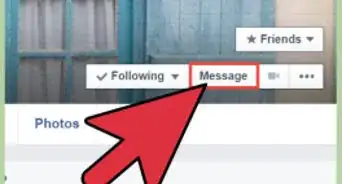

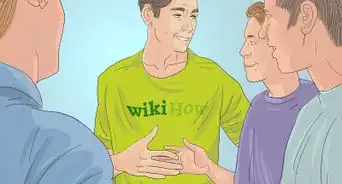









 Can Enemies Become Friends? How to Mend Your Relationship
Can Enemies Become Friends? How to Mend Your Relationship

References
- ↑ Ashley Pritchard, MA. School Counselor. Expert Interview. 4 November 2019.
- ↑ Ashley Pritchard, MA. School Counselor. Expert Interview. 4 November 2019.
- ↑ http://www.psychologytoday.com/blog/the-introverts-corner/201202/survey-says-how-meet-new-people
- ↑ https://au.reachout.com/articles/how-to-make-friends-at-school
- ↑ https://www.helpguide.org/articles/relationships-communication/dealing-with-loneliness-and-shyness.htm
- ↑ https://www.psychologytoday.com/us/blog/the-friendship-doctor/201112/its-tough-making-new-friends-in-high-school
- ↑ https://raisingchildren.net.au/pre-teens/behaviour/peers-friends-trends/teen-friendships
- ↑ https://au.reachout.com/articles/how-to-make-friends-at-school
- ↑ https://www.bbc.co.uk/bitesize/articles/znhf7nb
- ↑ https://www.helpguide.org/articles/relationships-communication/dealing-with-loneliness-and-shyness.htm
- ↑ https://www.bbc.co.uk/bitesize/articles/znhf7nb
- ↑ http://www.healthychildren.org/English/ages-stages/teen/school/Pages/Making-Friends-in-High-School.aspx
- ↑ https://www.helpguide.org/articles/relationships-communication/dealing-with-loneliness-and-shyness.htm
- ↑ https://www.helpguide.org/articles/relationships-communication/dealing-with-loneliness-and-shyness.htm
- ↑ https://kidshealth.org/en/teens/understanding-others.html
- ↑ https://au.reachout.com/articles/how-to-make-friends-at-school
- ↑ https://www.helpguide.org/articles/relationships-communication/dealing-with-loneliness-and-shyness.htm
- ↑ http://www.psychologytoday.com/blog/fulfillment-any-age/201107/10-tips-talk-about-anything-anyone
- ↑ http://www.healthychildren.org/English/ages-stages/teen/school/Pages/Making-Friends-in-High-School.aspx
- ↑ https://au.reachout.com/articles/how-to-make-friends-at-school
- ↑ https://www.bbc.co.uk/bitesize/articles/znhf7nb
- ↑ http://kidshealth.org/teen/school_jobs/jobs/rejection.html#
- ↑ https://www.helpguide.org/articles/relationships-communication/dealing-with-loneliness-and-shyness.htm
About This Article

Making new friends in high school can be nerve-wracking, but by putting yourself out there more and practicing your social skills, it’ll get way easier! Try joining a club, academic team, or athletic team as a fun way to meet like-minded people. Your school will probably have many options, from a literary magazine or gaming club to Model UN or cross-country. Electives like journalism or theater are also good places to get to know new people in a more relaxed setting! Then, try going to social events like dances, parties, and rallies. People are more likely to approach you there, especially if you smile and have an open, friendly expression. If you want to have a conversation with someone in class or at lunch, wait until they’re not distracted to say hi and maybe ask something like, “What’s the homework?” or “Who do you have for biology?” Remember to relax, keep asking the person about themselves, and give them your full attention! Once you’ve established a connection, get to know them better by going to something like a sporting event or movie together. For more tips on how to make and keep friends in high school, scroll down.
